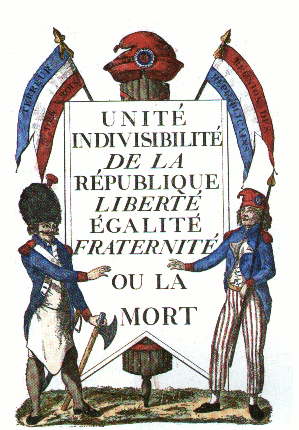
Social Order in France before the French Revolution.
France was categorized
by 3 estates: First estate was the clergy, second estate was the noble
and third estate was commoners. Before the French Revolution, the total
population in France was between 24-26 million. 130,000 were clergy, 500,000
were nobles, and the rest were commoners. The third estate was 96% of the
total population.
Although the number
of clergy was insignificant in France, they had influences contradicted
to their numbers. The church was an organization itself, or a country within
a country. The church had its own administrative body, vast land, and court
of laws. The church was very wealthy at that time. It had great income
from the crops of the land, donations and gifts from the nobles, and
fees like registration
of birth and death.

It traced back
to Louis XIV, the Sun King, spent lots of money in wars and building extraordinary
Versailles. Louis XV spent money on wars. In private life, he spent a lot
in his mistress, like Madame de Pompadour and Madame du Barry . He left
a huge royal debt to Louis XVI when after his death.
Louis XVI understood
the royal financial problem. He kept his best to maintain the balance in
his financial statements.
However, his beloved
brother Comte d’Artois and his wife Marie Antoinette were big spenders,
and asked Louis XVI for money when they ran out of it. Louis XVI gave them
money because of love. Whatever Louis XVI saved could never balance the
expenditure of those people.
Marie Antoinette's
marriage with Louis XVI was the arrangement by Louis XV and Empress Marie
Theresa from Austria in order to stop the years of wars. Marie Antoinette
felt loneliness after she left Austria. Madame de Polignac became the best
friend of Queen Marie Antoinette. In order to make her friend happy, Marie
Antoinette spent money to improve Madame de Polignac living standard. She
also spent money on clothes and diamonds to satisfy her desire. Although
Marie Antoinette did
not purchase the
diamond necklace, in the Diamond Necklace Affair , people concluded that
she spent France's money disregard the terrible living situation of her
citizens. People gave her the name "Madame Deficit".
The leadership
of Louis XVI was weak, and so was the prime minister. The officers of government
offices were held by the nobles, who only considered for their luxury lives.
Most of the finance ministers in Louis XVI era were nobles, except Jacques
Necker, a Swiss banker in France. The regional administration was lacked
of uniformity, the legal system was highly corrupted.
Worst of all,
the taxation system was the remainder of the old royal system and did not
adjust of the change of France environment. Direct taxes, which were the
main taxation of France, was levied on the peasants, the nobles were exempted
from it. There were also indirect taxes, was caused the burden of the peasants
worse.
The annual revenue
could not compensate the expenditure of the royal. The deficit grew larger
every year. The continue increase in tax could not solve the deficit problem.
Prices were risen because of the high taxation. Between 1785-1789, the
taxation and the
transformation
of the society from agricultural to industrial.